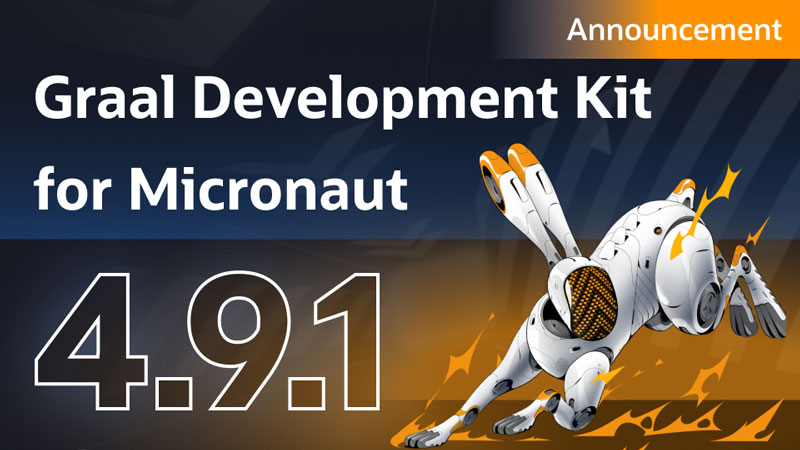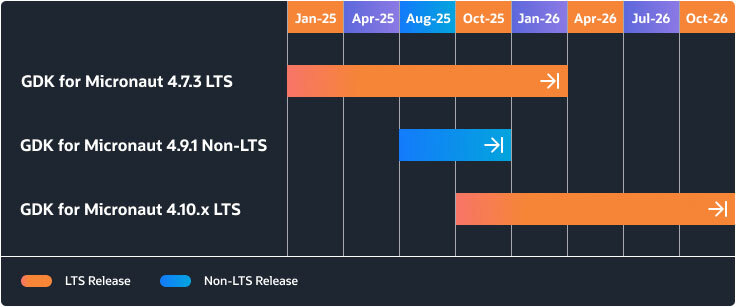
Today, Oracle is pleased to announce the general availability of Graal Dev Kit for Micronaut 4.9.1 based on the open source Micronaut framework 4.9.1. Let’s look at some of the notable changes in this release.
Graal Development Kit for Micronaut (GDK) is Oracle’s distribution of a curated set of open source Micronaut® framework modules and their dependencies, built from source with build provenance attestation and a software bill of materials (SBOM) to improve security. The GDK is optimized for ahead-of-time compilation with GraalVM Native Image, and is fully supported on Oracle Cloud Infrastructure. It also provides VS Code and IntelliJ extensions, a CLI and a web-based Launcher to accelerate application development and deployment. This enables you to build portable, cloud native Java microservices that start instantly and use fewer resources, reducing your compute costs.
Support Roadmap
Select GDK releases (identified by a major.minor.patch version, such as 4.7.3) are designated as Long-Term Support (LTS) releases. These LTS releases receive free backports for critical fixes from Oracle for a minimum of 12 months from their initial release date, ensuring stability and continuity. The GDK 4.7.3.5 critical patch update further enhances the stability of the 4.7.3 LTS release. In contrast, the upstream Micronaut project continues to deliver new features and fixes in each major and minor release. For your planning purposes, the anticipated GDK 2025 release schedule is outlined below:

Note that GDK 4.9.1 is a non-LTS release and will be superseded by GDK 4.10, the next scheduled LTS release.
Fast and Efficient Micronaut with GraalVM
Applications compiled with GraalVM Native Image start instantly, deliver peak performance without warmup, and have a low memory footprint. The charts below illustrate these advantages using the Micronaut MuShop Catalogue Service—a component of the MuShop demo, a cloud-native e-commerce application for cat products—as an example.

New Bill of Materials (BOM) with Micronaut Framework 4.9.1
This release upgrades the Micronaut framework from version 4.7.3 to 4.9.1. In addition to updates to several Micronaut modules, this upgrade introduces new features, including an experimental mode to run virtual threads on the Netty event loop, a new Micronaut Kubernetes Java Client generated from the official OpenAPI specification, Micronaut Data implementation support for the Jakarta Data 1.0 specification, Graceful Shutdown, and more. For more details, see Micronaut Framework Releases.
To upgrade, simply update your Maven pom.xml or Gradle build file to use the new GDK 4.9.1 BOM:
Maven
<parent> <groupId>cloud.graal.gdk</groupId> <artifactId>gdk-parent</artifactId> <version>4.9.1.1</version> </parent>
Gradle
dependencies {
...
micronautBoms(platform("cloud.graal.gdk:gdk-bom:4.9.1.1"))
...
}
Micronaut Coherence Built from Source
Starting with GDK 4.7.3.5, the GDK BOM now includes the micronaut-coherence module and its sub-modules, which are built directly from source. You no longer need to build these yourself.
New Guides for Microsoft Azure
This release includes two new guides for Microsoft Azure:
- Serverless: Create and Deploy a Micronaut Gateway Function as an Azure HTTP Function
- Tracing: Create and Trace a Micronaut Application Using Azure Monitor
Updated Launcher and CLI
The GDK Launcher, and GDK CLI have been updated with support for GDK 4.9.1. You can use the GDK Launcher to generate application starter templates for your preferred public cloud from a web browser. If you prefer command-line tools instead, use the GDK CLI.
Next Steps
- If you are using GDK 4.7.3.5 or earlier versions, you should consider updating to GDK 4.9.1.
- If you are new to the GDK, try the Get Started guide or one of our Hands-on Labs or Guides.
Micronaut® is a registered trademark of Object Computing, Inc. Use is for referential purposes and does not imply any endorsement or affiliation with any third-party product.
